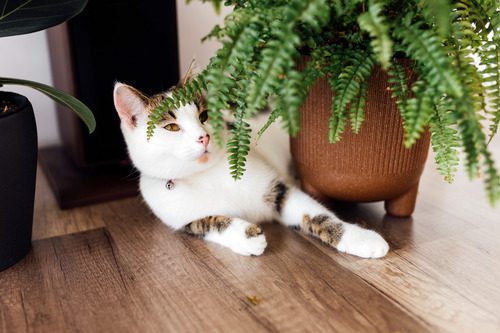Cats are curious by nature, and while their inquisitive behavior can be endearing, it can also lead them into danger, especially when it comes to certain plants. Some common household and garden plants are highly toxic to cats and can cause serious health issues if ingested. To help keep your feline friend safe, it’s crucial to be aware of these dangerous plants. This blog will cover eight poisonous plants and how they affect cats. For more information or to seek immediate assistance if you suspect your cat has ingested a toxic plant, call Country Club Animal Hospital at (305) 663-3300 or book an appointment online.

1. Lilies
Lilies are one of the most toxic plants for cats, and even a small amount can cause severe kidney damage. Common types of lilies that are harmful to cats include:
- Easter Lilies
- Tiger Lilies
- Day Lilies
- Asiatic Lilies
- Japanese Show Lilies
Symptoms of Lily Poisoning
If your cat ingests any part of a lily plant, symptoms can appear quickly. These include vomiting, lethargy, and loss of appetite. Without prompt treatment, kidney failure can occur within 24 to 72 hours, which can be fatal.
2. Sago Palms
Sago palms are popular ornamental plants found both indoors and outdoors. Every part of this plant is toxic to cats, but the seeds contain the highest concentration of toxins.
Effects of Sago Palm Poisoning
Ingesting sago palm can lead to severe liver damage, characterized by symptoms such as vomiting, diarrhea, seizures, and even liver failure. Immediate veterinary care is essential for any suspected ingestion.
3. Azaleas and Rhododendrons
These flowering shrubs are common in gardens and landscaping. While beautiful, they pose a significant risk to cats if ingested.
Symptoms of Azalea and Rhododendron Poisoning
Ingesting these plants can cause vomiting, diarrhea, drooling, and lack of appetite. Severe cases can lead to coma and potentially fatal cardiovascular collapse.
4. Oleander
Oleander is often used in landscaping for its attractive flowers and hardiness. However, it is extremely toxic to cats and other pets.
Toxic Effects of Oleander
Symptoms of oleander poisoning include gastrointestinal distress, such as vomiting and diarrhea, as well as severe effects on the heart, including arrhythmias and possibly death.
5. Dieffenbachia (Dumb Cane)
Dieffenbachia, commonly known as dumb cane, is a popular houseplant known for its large, attractive leaves. However, it contains calcium oxalate crystals that are highly toxic to cats.
Signs of Dieffenbachia Poisoning
If your cat chews on dieffenbachia, it can cause intense oral irritation, drooling, vomiting, and difficulty swallowing. In severe cases, it can lead to swelling of the mouth and throat, which can impede breathing.
6. Daffodils
Daffodils are popular springtime flowers known for their bright yellow blooms. Unfortunately, they are also poisonous to cats.
Symptoms of Daffodil Ingestion
Ingesting daffodils can cause severe vomiting, diarrhea, abdominal pain, and even respiratory issues. The bulbs are particularly toxic and can cause more serious symptoms like arrhythmias and low blood pressure.
7. Tulips and Hyacinths
These popular garden flowers are beautiful but dangerous for cats. The bulbs contain the highest concentration of toxins.
Effects of Tulip and Hyacinth Poisoning
Symptoms of ingestion include drooling, vomiting, and diarrhea. Ingesting large amounts can lead to more severe symptoms, such as increased heart rate and difficulty breathing.
8. Cyclamen
Cyclamen is a common houseplant known for its beautiful, vibrant flowers. However, it contains toxic compounds that can be harmful to cats.
Signs and Symptoms of Cyclamen Poisoning
If your cat ingests cyclamen, it can lead to excessive drooling, vomiting, and diarrhea. In severe cases, it can cause heart rhythm abnormalities and seizures.
Keeping Your Cat Safe from Poisonous Plants
While many plants add beauty to our homes and gardens, it’s important to be aware of the dangers they can pose to our pets. By keeping these eight poisonous plants out of reach of your cats, you can help ensure their safety and well-being. If you suspect your cat has ingested a toxic plant, contact Country Club Animal Hospital at (305) 663-3300 immediately or book an appointment online. Your prompt action can make a significant difference in the health and recovery of your feline friend.
